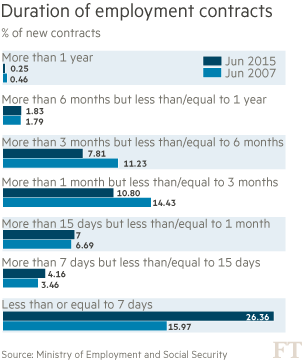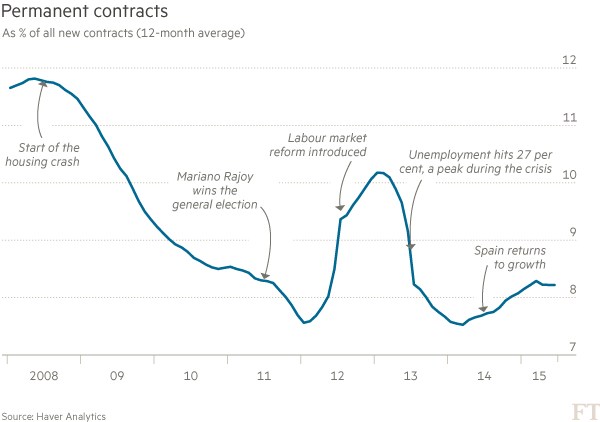August 4, 2015 11:17 am
New world of work: political cost of Spain’s recovery
Tobias Buck in Madrid
Price of economic revival is rise in number of workers on precarious contracts
 ©EPA
©EPA
Even those in traditionally secure professions such as teaching have found themselves on short-term contracts
When Ana Martín gets in touch with one of her clients these days, she usually has good and bad news. The good news is that there is a job offer. The bad news is pretty much everything that comes next.
Ms Martín works at a job placement centre in Villaverde, a low-income district in the south of Madrid. Before the crisis, many of its residents found steady work on building sites and other sectors that benefited from Spain’s decade-long construction boom. But that kind of work disappeared years ago. What is on offer now are jobs that Ms Martín passes on with a heavy heart.
Over the past two years, Spain has won international admiration for turning around its once-shaky economy. At the height of the crisis, Madrid pushed through unpopular austerity measures and painful economic reforms, including a sweeping overhaul of the labour market.
Wage costs fell and exports boomed, allowing the rest of the economy to recover as well.
The price of that recovery, however, is a notable rise in the number of workers who labour in precarious conditions.
With a general election looming later this year, this is set to emerge as a key political battleground. While the government is trumpeting the sharp decline in unemployment, opposition parties are hammering away at the fate of the working poor.

This could be one reason why the government of Mariano Rajoy is struggling in the polls, says Pablo Simon, a professor of political science at Madrid’s Carlos III University. “The important thing for elections is not economic growth, but the perception of economic growth. And if there is a lot of inequality, then the way people perceive a recovery will also be unequal.”
According to official data, one in eight Spanish workers — or 2.28m in absolute numbers — earns only the minimum salary or less. Before the crisis, the number of workers bringing home such little pay was just one in 12. Salaries have dropped across the board, but especially so for those forced to move into the temporary sector: according to a recent study by Fedea, the economics think-tank, a worker who used to have a permanent contract and now works on a temporary basis will on average earn 48 per cent less than before.

“The working poor are a reality in Spain now,” says Marcel Jansen, a professor of economy at Madrid’s Autónoma University.
Spain is creating plenty of jobs — about 1.4m contracts are signed every month — but only a tiny fraction of these are for stable, open-ended positions. In April, for example, one out of four contracts lasted a week or less. In 2007, the year before the property bubble burst, it was one in six. Over the same period of time, the average duration of all contracts fell from 78 to 55 days.
Once the preserve of low-skilled seasonal workers in sectors such as tourism and farming, temporary contracts have now become commonplace, even in middle-class professions such as teaching. Last year, for example, more than 174,000 teachers lost their jobs between May and August, only to be rehired once the new school year was under way. By October, the overall number was almost exactly back to where it was before the summer.
“Companies and employers are shifting the risks they face on to their workers — and to the state itself,” says Prof Jansen. “There is now a culture of precariousness in the minds of employers — they have simply gotten used to it.”

The trend towards precarious work may improve the bottom line in the short term. For the economy as a whole, however, the constant churn of workers on short-term contracts makes little sense, argues José Ignacio Conde-Ruiz, a professor of economy. “Where is the incentive for a company to invest in its human capital? They know they will fire their workers after maximum two years anyway. So behind all this is also the issue of productivity.”
For the unemployed in Villaverde, the immediate challenge is to find a steady job with a decent salary. But, as Mr Díaz points out, the harsh new demands placed on workers go beyond pay and working hours. Some restaurants, for example, now demand that waiters bring their own uniforms.
Whatever the conditions, all vacancies are ultimately filled. “We have millions of unemployed in Spain,” remarks Mr Díaz. “There is always someone who says Yes.”
0 comments:
Publicar un comentario